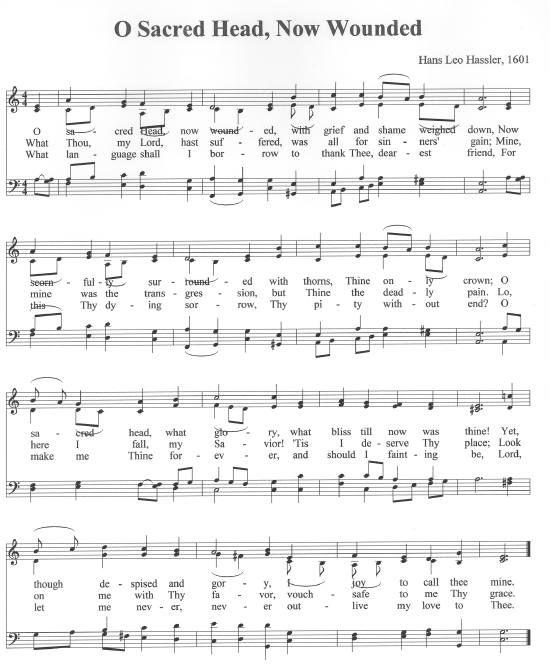I Would Weep

When I was young I would weep through communion.
Prior to taking the Lord's Supper, which we did every Sunday, it was the tradition at my church to sing a reflective song, often one in a minor key, that made us dwell upon the sacrifice and suffering of Jesus.
Sometimes the song focused upon Jesus praying and weeping in the Garden of Gethsemane. Songs like "Tis Midnight And On Olive's Brow":
'Tis midnight, and on Olive's brow
The star is dimmed that lately shone;
'Tis midnight in the garden now,
The suff'ring Savior prays alone.
'Tis midnight, and for other's guilt
The Man of Sorrows weeps in blood;
Yet He that hath in anguish knelt
Is not forsaken by His God.
'Tis midnight, and from ether-plains
Is borne the song that angels know
Unheard by mortals are the strains
That sweetly soothe the Savior's woe.
Other songs focused upon the passion and crucifixion of Jesus. Songs like "O Sacred Head":
O sacred Head, now wounded,
with grief and shame weighed down,
now scornfully surrounded
with thorns, thine only crown:
how pale thou art with anguish,
with sore abuse and scorn!
How does that visage languish
which once was bright as morn!
What language shall I borrow
to thank thee, dearest friend,
for this thy dying sorrow,
thy pity without end?
O make me thine forever;
and should I fainting be,
Lord, let me never, never
outlive my love for thee.
I would weep through these songs, the tears often carrying through the communion service. My heart would break each week during the Lord's Supper.
Theologically at this time my mind was governed by what we call penal substitutionary atonement. A part of what brought me to tears was the knowledge that Jesus had suffered for my sins. And each week I felt a deep sorrow for that.
But here's the strange thing. The peculiar alchemy that mixed this theology with my personality within that faith community didn't produce in me a toxic, guilt-ridden faith.
To this day I'm puzzled by this as I am very aware that this was not everyone's experience growing up in my faith tradition, or within conservative Christianity generally. For many others something in the mixture of personality, doctrine and faith community created a toxic and poisonous religious experience characterized by fear, shame and guilt. Along with a vision of a brooding and wrathful God.
But not so with me. For some reason, while I knew that Jesus was suffering for my sins, my sins were not my focal point. All I felt in those songs was how much Jesus loved me. Even though I was a mess and a sinner. Jesus was willing to do that for me. And if that were true, then how much did he love me? It was, by my calculation, a love beyond measure.
I didn't feel traumatized or abused or scared. I felt loved.
And that feeling has never really left me. No matter my failures. No matter my sins. No matter my brokenness. Jesus loves me.
And that has been the template and model for my own love, what my love aspires to. No matter your failures. No matter your sins. No matter your brokenness. Love. Unconditionally.
People often ask me, how did I get from A to Z? How did I grow up in a sectarian and fundamentalist faith tradition to get to where I am today, theologically speaking, all the while looking back upon the past with great love, affection and gratitude?
How'd that happen given the very different experiences of others?
Truthfully, I have no idea. I can't explain how it happened, but I can describe what happened. I heard the same message but drew a different conclusion. I wept over my sins, like everyone else, knew Jesus died for my sins, like everyone else, but I felt love rather than wrath.
And if I'm honest, I miss that feeling.
Progressive Christians don't typically weep over their sins when they contemplate the cross or take the Lord's Supper.
But I used to.
And I still do from time to time. Maybe it's nostalgia. Maybe it's sentimentality. Maybe it's bad theology.
But I still weep for my sins.
And I still feel loved.



